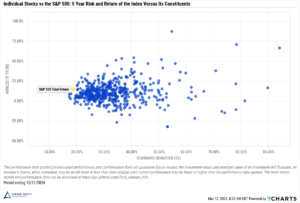Whether you work for a private company about to IPO or one that’s recently gone public, you may wonder what that means for employees and their stock options. Financially, what an IPO means for current and former employees mostly depends on when you were hired.
For early-stage employees and founders with stock, going public can potentially be life-changing. For workers hired closer to the IPO, there’s still potential for some type of cash windfall. If you don’t have stock options or equity, going public will likely just be business as usual. For employees with stock, here’s what happens to owned shares and stock options when your company goes public.
Employees may wonder what happens to their stock options or common stock when their company goes public. An IPO provides liquidity for the company. It’s also an exit strategy for founders, investors, and a way for employees to sell their shares in the company too.
What happens to employees with stock options during an IPO?
If you still work for the company, or if you’ve left and exercised your options, an IPO can mean considerable newfound wealth for employees. Here’s an outline of key considerations; the rest of this article discusses these items in detail.
Exercise strategy:
- Timing: Consider the tax implications of exercising vested options before or after the IPO, timing of sales, and tax planning opportunities.
- Cash flow: Depending on the type of equity you have, exercising can be challenging given tax implications and having cash to buy the stock. Consider options like a cashless or net exercise to help with liquidity.
- Tax implications: Again, understand the tax consequences of exercising and selling options, including ordinary income tax, withholding, alternative minimum tax, and what an IPO means for employees with double-trigger RSUs.
Sales and trading plan:
- Taking profits: Once the lockup period ends, consider diversifying your holdings to reduce risk.
- Tax planning: Does your stock qualify for the tax-free sale of qualified small business stock? In working with your tax professional and investment advisor, make a tax plan that incorporates your diversification goals and considers tax strategies on new exercises.
- Financial planning: It’s a highly nuanced situation when a company goes public. Seriously consider working with a firm like Darrow Wealth Management that specializes in stock option and IPO planning.
Logistical and administrative changes:
- Stock plan administrator and transfer agent: Vested and unvested stock options will go to the stock plan administrator, which often changes after a company goes public. A transfer agent usually holds shares of common stock. Switching providers will impact how long it takes for employees to get liquidity, even without a lock up period.
- Lockup and blackout periods: Until the post-IPO lockup expires, you can’t sell your shares. If you’re a former employee, make sure to keep contact information current with the company to find out if you’re part of the lockup and how you can trade and move shares. Quarterly blackout periods can also prevent workers from buying or selling company shares.
- 10b5-1 plans: To help prevent insiders from running afoul of securities laws and trading on material nonpublic information, senior executives may need to run all sales through a 10b5-1 trading plan. There are many ways to structure a 10b5-1 trading plan, so discuss your goals with a wealth advisor.
Exercising stock options around an IPO
Before the IPO, get your advisory team together. Consider working with a financial advisor and tax professional to develop an exercise and diversification strategy that’s aligned with your entire financial situation and goals.
An initial public offering is a liquidity event with the potential for major tax implications. Developing a tax-efficient exercise and sale strategy is a key part of maximizing net proceeds from an IPO. Especially if you plan to leave the company after it goes public, you’ll need a plan to exercise shares.
What employees should do with stock options and RSUs before their company goes public (VIDEO)
Incentive stock options (ISOs)
ISOs qualify for favorable long-term capital gains tax treatment if held for at least two years from the grant date and one year from the exercise date. After an IPO, it’s important to balance possible tax benefits in reaching the qualifying holding period with the risk of holding the stock.
When you exercise and hold ISOs through the end of the year, it can trigger the alternative minimum tax. So you’ll need cash to pay the AMT if you don’t sell your shares. You’ll also need funds to buy the shares at exercise or opt for a net exercise (also called sell-to-cover).
Consider developing a liquidation plan and an exercise strategy together. Often, a combination of sales and exercise-and-hold shares can limit or avoid triggering the AMT. This is also true for employees who have multiple types of equity.
Nonqualified stock options (NSOs)
Nonqualified employee stock options are taxed at exercise and any further gain can qualify for long-term capital gains if held for one year after exercise. Here’s more on how stock options are taxed.
If you have non-qualified stock options, consider the cash flow implications after your employer goes public. At exercise, your employer should withhold a portion of pay for taxes (either 22% or 37%). This is often done by withholding cash or shares. Again, work with your team to consider a sales and exercise strategy.
When Should You Exercise Stock Options?
Should you exercise right before the IPO?
Depending on your lockup period, exercise price, and if you’re considered one of the company insiders, it may not make sense to exercise your options until after the IPO and lockup. That way, there’s no risk of exercising and having the shares lose value without liquidity, especially with a looming tax bill. It can also help you avoid having already exercised shares go underwater during a lockup. Initial public offerings are very volatile so employees should expect the stock to fluctuate regularly.
Selling and diversifying concentrated company stock
If you work for a company while it goes public, it is probably a very exciting time. However, it is important that you remain as objective as possible about your employer and work to develop a plan to liquidate and diversify your equity by selling shares when the time is right.
When considering whether to hold or sell your stock after the lockup period, it’s important to balance between turning paper profits into realized gains and participating in possible future upside. Ask yourself: if you were given a cash bonus, would you use it to buy more company stock?
What Happens to Stock Options if I Leave the Company?
Taking profits
Luckily, there are ways to diversify out of a concentrated position, and the IPO makes it easier. If you expect a large windfall, it’s important to carefully consider your investment decision.
Here are some aspects to consider in your sales plan:
- Do you have a cash goal? Money to invest in a brokerage account, boost savings, new purchases, pay down high cost debt, etc.? How much net cash do you expect after buying the stock, taxes, new exercises, etc.? Will it be enough money to fund everything you want to do? Make sure you have enough liquidity for taxes.
- Set price targets has pros and cons. Setting a price target after an IPO can be challenging. Investors tend to anchor to the IPO price or all-time high in the open market. Realistically, any stock may never recover to these levels. And if the stock is doing better than expected, employees can be tempted to move the goal posts. Consider your risk tolerance and overall concentration. If you’re highly concentrated and reluctant to diversify, you may have more to lose if the stock price gets cut in half than you stand to gain if it doubled instead.
- Review your holdings and consider capital gains tax. In working with your team, consider what grants or common stock to sell in the most tax efficient way by looking at cost basis, strike price, holding periods, etc. Also consider any additional purchases of ISOs that won’t trigger the alternative minimum tax. The tax treatment can be highly nuanced, especially with considerations like QSBS and earnout shares.
- Consider trading strategies. Volume relative to your sales goals, options strategies (like writing a covered call) after the lock up period if you left the company, limit orders, dollar-cost averaging versus selling a big market order, etc.
There’s a lot to consider when diversifying what could be a one-time liquidity event and this is just the beginning. So it’s important to seek investment advice.
Read more: 5 Ways to Diversify a Concentrated Stock Position
Restricted stock units: double-trigger RSUs in an IPO
Restricted stock units are different than employee stock options because they are awarded, not purchased. Unlike stock options, RSUs always have value as long as the company is solvent.
When RSUs are awarded at private companies, they typically have two vesting requirements, otherwise known as double-trigger RSUs. If you have double-trigger restricted stock units, going public will have major income tax implications (it’s really a tax bomb) as the IPO is the second trigger. When the company goes public, all time-based vested shares will fully vest and taxable as regular income.
RSU-holders also have lock-up periods, though it’s common for employees to be able to sell some shares shortly after an IPO to meet tax withholding requirements. The company will share the details and limitations of this type of early tax release program.
Lock up periods for new publicly traded companies
There’s almost always a lockup period after an IPO that prevents insiders and employees from selling their shares.
Companies going public with a direct listing bypass the lockup period, meaning employees can sell their stock options right away if they choose. Companies going public via SPAC may have longer lockup periods or none at all.
A lockup period can range from 90 to 180 days. A stock price may also drop when this period expires, as employees can sell shares (more supply!). Lockups vary: sometimes it’s a stated number of days, event based (such as reaching a target share price or an earnings release), multi-stage release, etc. Restrictions often also apply to former employees.
Blackout periods
A major change for employees when their company goes public are the rules, regulations, reporting requirements, and overall visibility of publicly traded companies. For the majority of employees, regular quarterly blackout periods will become the norm. Private company executives might have experienced periodic blackouts before a funding round or 409a update.
A blackout is a period of time, commonly around earnings releases, when employees are prohibited from buying or selling shares. The business will decide what is/isn’t permitted, who the blackout period applies to, and for how long. Blackout periods typically range from two weeks to two months, often ending one or two days after earnings are released.
Sudden wealth advisors
Darrow Wealth Management specializes in stock options and equity compensation. If your employer is going public, work with an advisor experienced with strategic stock option planning, tax implications, and strategies to best manage sudden wealth. You only get one shot at this.
Schedule a call
Here are some ways we help executives, founders, and employees navigate an IPO:
- Exercise strategies
- Trading plan and execution
- Assist with identifying and tracking shares likely to qualify for the tax-free sale of qualified small business stock
- Decide on a strategy to best use the proceeds, including funding multiple goals and investment management services to help you diversify sudden wealth
- Incorporating the proceeds from a major liquidity event into your financial goals and projections
- 10b5-1 plan design












